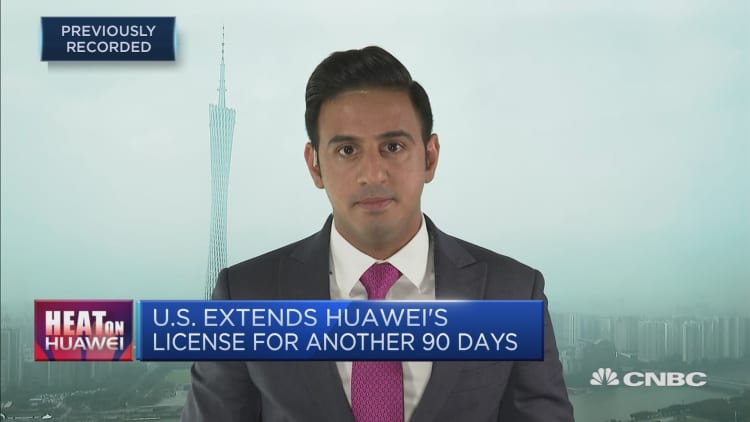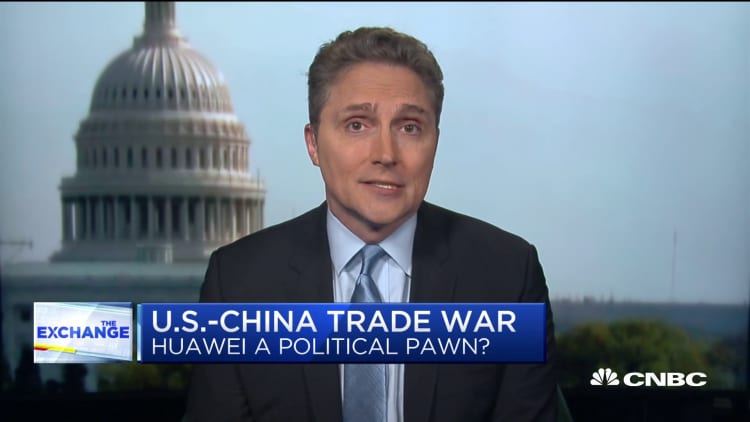
The U.S. government's decision to add more of Huawei's affiliates to a blacklist is "unjust" and "politically motivated" and will not help the country advance its technological leadership, the Chinese telecommunications giant said Tuesday.
U.S. Commerce Secretary Wilbur Ross announced Monday that it was extending by another 90 days a temporary reprieve for Huawei to continue doing business with American companies. The deadline had lapsed on Monday. However, the Bureau of Industry and Security also added another 46 Huawei affiliates onto the blacklist.
"These actions violate the basic principles of free market competition. They are in no one's interests, including U.S. companies," Huawei said in a statement.
In May, Huawei was put on the U.S. Entity List, which restricts American firms from doing business with the Chinese company. Shortly after, Washington offered a 90-day reprieve for Huawei, allowing U.S. businesses to continue selling limited and specific products to the Chinese telecom.
"As we continue to urge consumers to transition away from Huawei's products, we recognize that more time is necessary to prevent any disruption," Ross said in a statement.
Some American rural mobile networks use Huawei gear while some U.S. technology component companies rely on a significant portion of revenue from the Chinese giant.
Ross reiterated his concern that Huawei poses a national security threat. The U.S. has maintained that Huawei's equipment could be used as a backdoor by the Chinese government to spy on Americans, allegations the company has repeatedly denied.
'Unjust'
Speaking to The Associated Press, Huawei founder Ren Zhengfei said Tuesday he expects no relief from Washington and his company was making plans as if American export restrictions will not go away.
"Right now, attacking Huawei in the United States is politically correct, while helping Huawei even once would put them under significant pressure. So to us, the entity list will be there for quite some time," he said.
In a statement on Tuesday, Huawei called Washington's decision to add more of its affiliates to the Entity List "politically motivated."
"Attempts to suppress Huawei's business won't help the United States achieve technological leadership," Huawei said. "We call on the US government to put an end to this unjust treatment and remove Huawei from the Entity List."
The company added that the decision "won't have a substantial impact" on business. Huawei Chairman Liang Hua said that "neither production nor shipment has been interrupted, not for one single day."
Still, earlier this year, Huawei slashed its revenue forecast and predicted a $30 billion hit to its revenues over the next two years.
It's clear to me at least, that the president views Huawei as a bargaining chip and a pressure point for a trade deal.James PethokoukisFellow at the American Enterprise Institute
Huawei has been focusing on trying to develop more of the core technology that had been provided by U.S. companies. The telecom equipment maker is continuing to design its own processors and modems for smartphones.
It also recently released its own operating system called HarmonyOS, even though it currently uses Google's Android for its smartphones and Microsoft's Windows for laptops.
Richard Yu, CEO of Huawei's consumer business, said last week that if the company is permanently cut off from Google, it could switch to the new operating system "immediately."
Huawei a 'bargaining chip'
Huawei has been caught up in the broader U.S.-China trade war. President Donald Trump has sent mixed signals over the last few months about the fate of Huawei in the U.S.
In May, Trump said that it was "possible that Huawei would be included in a trade deal."
But just this weekend, he said he didn't want to do business with Huawei "because it is a national security threat."
Some experts have suggested that the Chinese tech firm is being used as a "bargaining chip" in the U.S.-China trade war.

"It's clear to me at least, that the president views Huawei as a bargaining chip and a pressure point for a trade deal. ... There are certainly those in the administration that would like to kill this company and they view it as kind of an opening shot in a long-term cold war with China," James Pethokoukis, Dewitt Wallace fellow at the American Enterprise Institute, told CNBC's "The Exchange" on Monday. "I just don't see evidence that Trump thinks that."
"That's the president's problem," Pethokoukis added. "If he's calling it right now that they're a national security issue, if that's the case, then it's hard to come to a trade deal that doesn't involve some sort of limitation on Huawei. It's hard to see the end game there."


